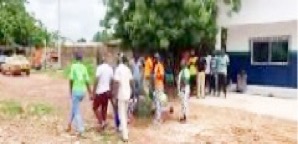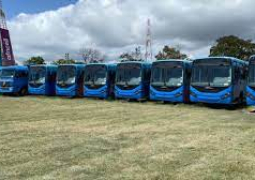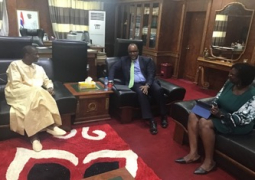
These issues were highlighted during a dialogue with the Office of National Security, focusing on the importance of upholding human rights and the rule of law within the context of security sector reform.
Alkalo of Basse Kabakama, Salieu Bah, spoke about the community’s fear of police threats related to various charges they impose on individuals.
“The police charge us for helmets, and other alleged road offences, which creates significant disturbance for us. They constantly look for faults to take money from us or threaten imprisonment if we fail to pay,” Alkalo Bah emphasised.
The Alkalo stressed that if such complaints are reported to the government office there which he said is doing well in calming residents, the police would ask them to provide evidence and if they could not, their claims would be invalidated, and sometimes they get detained without charge for over 72 hours till bail is paid.
In a similar vein, the community police focal person from URR expressed disappointment regarding the treatment by former commissioners and some police officers on the highway.
“I was the first victim of a helmet arrest during the former commissioner’s first week in office in URR,” he recounted. “I was rushing my mother-in-law to the hospital because the escort didn’t fit in the ambulance so I put her on my motorbike without a helmet. We came up to the police line when the commissioner stopped me for not wearing one and charged me D2,500 on the spot without allowing me to explain and stated that I would be taken to court.”
Mr Sowe said that despite his pleas to the commissioner to allow him to take the sick person to the hospital and report back afterwards, he was forced to pay the fine. When he asked for a receipt, he was told to pay an extra D3,000 making it D5,000, which he refused, since no receipt was provided.
Additionally, Sowe narrated that the paramilitary officers are also a hindrance in their areas. “They would come on you with their AK47 around the Wuli East and West looking at every single thing to find fault only to extort, or sometimes they would shout at you to forcefully make you stand, threatening with their guns, without even a checkpoint to indicate they are there,” he said.
The Alkalo of Sabi also emphasised they are the ones affected the most, saying not only the paramilitary but the entire police within the URR are applying the same extortion tactics.
“If you are in The Gambia and just 50 meters from the border, they would stop you to pay for a ‘Laissez-Passer’ as Gambians. If you don't have it, they would detain you and take you to court, which is disturbing for us,” he complained.
Moreover, Aja Kumba, a resident, reported that the police sometimes conduct patrols, and during searches, they might plant substances on individuals to falsely implicate and charge them without following due process.
Additionally, Alkalo Kabakama Fatou Danso questioned whether it was mandatory for the drug squad to charge someone who was not found with drugs, simply for being a suspect during a search.
However, representatives of people with disabilities expressed gratitude to the police for recognising and supporting them within the community.
“In our case, the police respect us a lot. They control drivers when we are on the road because the Basse route is narrow. Just last week, a motorbike hit one of us, and the police ensured that all necessary needs were addressed. The immigration officers also make sure we don’t have to queue to get our ID cards,” they said.
Similarly, other speakers praised the army for their outstanding support of the Basse community. They highlighted that since the change of government and the implementation of the security sector reform, the army have been working hand-in-hand with residents in various areas or services, including blood donations and community cleaning exercises.



